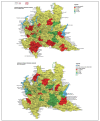Business Intelligence applied to Emergency Medical Services in the Lombardy region during SARS-CoV-2 epidemic
- PMID: 32420923
- PMCID: PMC7569617
- DOI: 10.23750/abm.v91i2.9557
Business Intelligence applied to Emergency Medical Services in the Lombardy region during SARS-CoV-2 epidemic
Abstract
Background and aim of the work: On the 21st of February, the first patient was tested positive for SARS-CoV-2 at Codogno hospital in the Lombardy region. From that date, the Regional Emergency Medical Services (EMS) Trust (AREU) of the Lombardy region decided to apply Business Intelligence (BI) to the management of EMS during the epidemic. The aim of the study is to assess in this context the impact of BI on EMS management outcomes.
Methods: Since the beginning of the COVID-19 outbreak, AREU is using BI daily to track the number of first aid requests received from 112. BI analyses the number of requests that have been classified as respiratory and/or infectious episodes during the telephone dispatch interview. Moreover, BI allows identifying the numerical trend of episodes in each municipality (increasing, stable, decreasing).
Results: AREU decides to reallocate in the territory the resources based on real-time data recorded and elaborated by BI. Indeed, based on that data, the numbers of vehicles and personnel have been implemented in the municipalities that registered more episodes and where the clusters are supposed to be. BI has been of paramount importance in taking timely decisions on the management of EMS during COVID-19 outbreak. Conclusions: Even if there is little evidence-based literature focused on BI impact within the health care, this study suggests that BI can be usefully applied to promptly identify clusters and patterns of the SARS-CoV-2 epidemic and, consequently, make informed decisions that can improve the EMS management response to the outbreak.
Conflict of interest statement
Each author declares that he or she has no commercial associations (e.g. consultancies, stock ownership, equity interest, patent/licensing arrangement etc.) that might pose a conflict of interest in connection with the submitted article.
Figures






References
-
- Azienda Regionale Emergenza Urgenza. http://www.areu.lombardia.it/
-
- Chen H, Chiang R.H.L, Storey V.C. Business Intelligence and Analytics: From Big Data to Big Impact. MIS Quarterly. 2012;36(4):1165–1188.
-
- Loewen L, Roudsari A. Evidence for Business Intelligence in Health Care: A Literature Review. Stud Health Technol Inform. 2017;235:579–583. Review. - PubMed
MeSH terms
LinkOut - more resources
Full Text Sources
Medical
Research Materials
Miscellaneous

